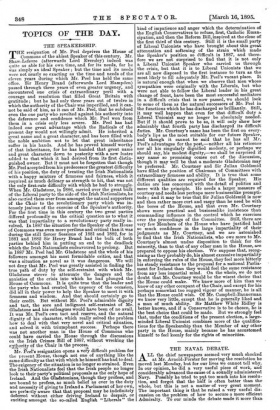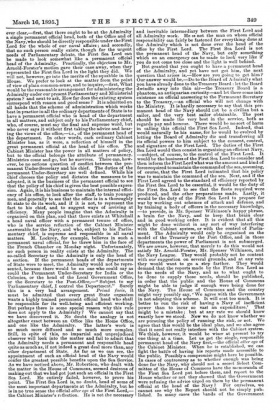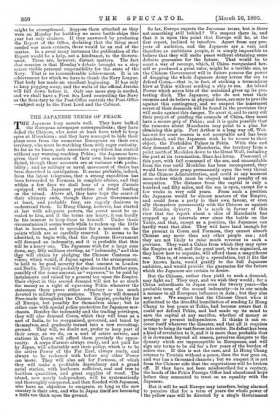THE NAVAL DEBATE.
ALL the chief newspapers seemed very much shocked at Mr. Arnold-Forster for moving the resolution he moved last Monday, but for our lives we cannot tell why. In our opinion, he did a very useful piece of work, and considerably advanced the cause of a soundly administered Navy. Possibly he tried to put too much into his resolu- tion, and forgot that the half is often better than the whole, but this is not a matter of very great moment. The important thing is that he raised a very useful dis- cussion on the problem of how to secure a more efficient Admiralty. To our minds the debate made it more than ever clear,—first, that there ought to be at the Admiralty a single permanent official head, both of the Office and of the Navy,Who should be directly responsible under the First Lord for the whole of our naval affairs ; and secondly, that no such person really exists, though for the urgent needs of Parliamentary debate, the First Sea Lord can be made to look somewhat like a permanent official head of the Admiralty. Practically, the objectors to Mr. Arnold-Forster's motion gave their case away, when they represented the First Sea Lord in the light they did.. We will not, however, go into the merits of the squabble in the House. We prefer to look at the matter from the point of view of plain common-sense, and to inquire,—first, What would be the reasonable arrangement for administenng the Admiralty under our present Parliamentary and Ministerial system ? and next to ask, How far does the existing system correspond with reason and good sense ? It is admitted on all hands that the scheme of administration which works best in practice in all the ordinary departments of State is to have a permanent official who is head of the department in all matters, and subject only to his Parliamentary chief, who, of course, must say the final and supreme word, but who never says it without first taking the advice and hear- ing the views of the office,—i.e., of the permanent head of the department. In other words, each ordinary Cabinet Minister has, as it were, a reflection of himself in the great permanent official at the head of his office. The Cabinet Minister has the power in all matters of policy, but to the official belongs the attribute of permanency. Ministries come and go, but he survives. There can, how- ever, be no serious question of conflict between the per- manent Under-Secretary and his chief. The duties of the permanent Under-Secretary are well defined. While his chief chooses the policy and dictates the measures to be adopted, it is the business of the permanent official to see that the policy of his chief is given the best possible expres- sion. Again, it is his business to maintain the internal effici- ency of his office, to look after the staff, to train younger men, and generally to see that the office is in a thoroughly fit state to do its work, and if it is not, to represent the fact to his chief, and to suggest ways of arriving at efficiency. Many people imagine that the Admiralty is organised on this plan, and that there exists at Whitehall a head naval officer with a permanent tenure of office, who is the service reflection of the Cabinet Minister answerable for the Navy, and who, subject to his Parlia- mentary chief, is supreme and responsible in all naval matters. M. Lockroy, for example, believes in such a permanent naval official, for he threw him in the face of the French Chamber on Monday night. Unfortunately, no such person in reality exists at the Admiralty. The so-called Secretary to the Admiralty is only the head of a section. If the permanent heads of the departments of State were to meet, the Admiralty would not be repre- sented, because there would be no one who could say as could the Permanent Under-Secretary for India or the Colonies, or the head of the Local Government Office, or the Secretary to the Post-Office,—" Subject to ray Parliamentary chief, I control the Department." Surely this is a very bad arrangement. Primei facie, it must be admitted that every great State organism wants a highly trained permanent official head who shall be responsible for its well-being and efficient working. But perhaps there is some special reason why this rule does not apply to the Admiralty ? We cannot say that we have discovered it. No doubt the analogy is not altogether exact between an Office like the Home Office, and one like the Admiralty. The latter's work is so much more diffused and so much more complex. Still, in spite of this, no impartial and unprejudiced observer will look into the matter and fail to admit that the Admiralty needs a permanent and responsible head quite as much as, if not indeed a great deal more than, any other department of State. As far as we can see, the appointment of such an official head of the Navy would confer the greatest possible benefits upon the Sea Service. As we have noticed above, Mr. Robertson, who dealt with the matter in the House of Commons, seemed desirous of making out that we had got just such an official in the First Sea Lord. He entirely failed, however, to prove his point. The First Sea Lord is, no doubt, head of some of the most important departments at the Admiralty, but he is in no true sense the official alter ego of the First Lord,— the Cabinet Minister's reflection. He is not the necessary and inevitable intermediary between the First Lord and all Admiralty work. He is not the man on whom official responsibility can fairly be fastened for everything done at the Admiralty which is not done over the head of the office by the First Lord. The First Sea Lord is not the permanent head of the Navy, but only something which on an emergency can be made to look very like if you do not come too close and the light is well behind.
But granted that you ought to have a permanent head of the Admiralty, and yet have not got him, the next question that arises is,—How are you going to get him ? Our answer would be,—Do to the Board of Admiralty what you have already done to the Treasury Board : let the Board dwindle away into thin air—the Treasury Board is a phantom, an antiquarian curiosity—and let there come into existence an official answering to the Permanent Secretary to the Treasury,—an official who will not change with the Ministry. It is hardly necessary to say that this per- manent head of the Navy should rot be a civilian but a sailor, and the very best sailor obtainable. The post should be made the very best in the service, both as regards pay and honour. There would be no sort of harm in calling this official the First Sea Lord. Indeed, that would naturally be his name, for he would be evolved by letting the Board of Admiralty die and transferring all its official powers to him subject to the consent, control, and signature of the First Lord. The duties of the First Sea Lord would then consist in organising an efficient Navy, —subject, of course, to the control of the First Lord. It would be the business of the First Sea Lord to consider and. then inform the First Lordwhat was the amount and kind of force required to maintain the command of the sea, assuming, of course, that the First Lord intimated that his policy was to maintain the command of the sea. Next, and if the First Lord agreed to the standard of efficiency reported by the First Sea Lord to be essential, it would be the duty of the First Sea Lord to Bee that the fleets required were produced, and the other preparations made. Lastly, it would be the duty of the First Sea Lord to prepare for war by working out schemes of attack and defence, and by training a body of officers in the necessary knowledge, —to provide, in Mr. Spenser Wilkinson's happy phrase, a brain for the Navy, and to keep that brain clear and in good working order. It is evident that all this might be done without in any sort of way interfering with the Cabinet system, or with the control of Parlia- ment. The Admiralty would only be organised on the model of the Treasury or the Post Office, and in those departments the power of Parliament is not submerged. We are aware, however, that merely to do this would not satisfy Mr. Arnold-Forster, Mr. Spenser Wilkinson, and the Navy League. They would probably not be content with our suggestion on several grounds, and at any rate they would want to go a step farther. They would demand that the reports made by the First Sea Lord as to the needs of the Navy, and as to what ought to be done to supply those needs, should be published, in order that the public and the House of Commons might be able to judge if enough were being done for the Navy. The House of Commons and the country might very possibly say, We agree with the Government in not adopting this scheme. It will cost too much. It is better to run the risk of having a Navy of inefficient power than to incur so vast an expenditure.' That might be a mistake ; but at any rate we should know exactly how we stood. Now we do not know whether we are pursuing the policy of running the risk, or not. We agree that this would be the ideal plan, and we also agree that it need not really interfere with the Cabinet system. We think, however, it would be wiser at present to .try one thing at a time. Let us get the single, responsible permanent head of the Navy first,—the official alter ego of the Cabinet Minister. When he is established, we can fight the battle of having his reports made accessible to the public. Possibly a compromise might here be possible. In cases of controversy as to whether enough was being done for the Navy, why should not a secret Select Com- mittee of the House of Commons have the memoranda of the First Sea Lord put before them, and report to the House whether or not they showed that the Government were refusing the advice urged on them by the permanent official at the head of the Navy ? For ourselves, we cannot see why the Report should not be simply pub- lished. In many cases the hands of the Government might be strengthened. Suppose them attacked as they were on Monday for building no more battle-ships this year but only cruisers. If they answered by producing the Report of the Office, declaring that the thing most needed was more cruisers, there would be an end of the matter. In a great many instances the publication of the Report would be a help, not a hindrance, to the Govern- ment. These are, however, distant matters. The fact that remains is that Monday's debate brought us a step nearer visible personal responsibility for the state of the Navy. That is no inconsiderable achievement. It is an achievement for which we have to thank the Navy League. That body has made an excellent beginning. It has only to keep pegging away, and the walls of the official Jericho will fall down before it. Only one more step is needed, and we shall have a First Sea Lord controlling the Navy as the Secretary to the Post-Office controls the Post-Office —subject only to the First Lord and the Cabinet.




































 Previous page
Previous page